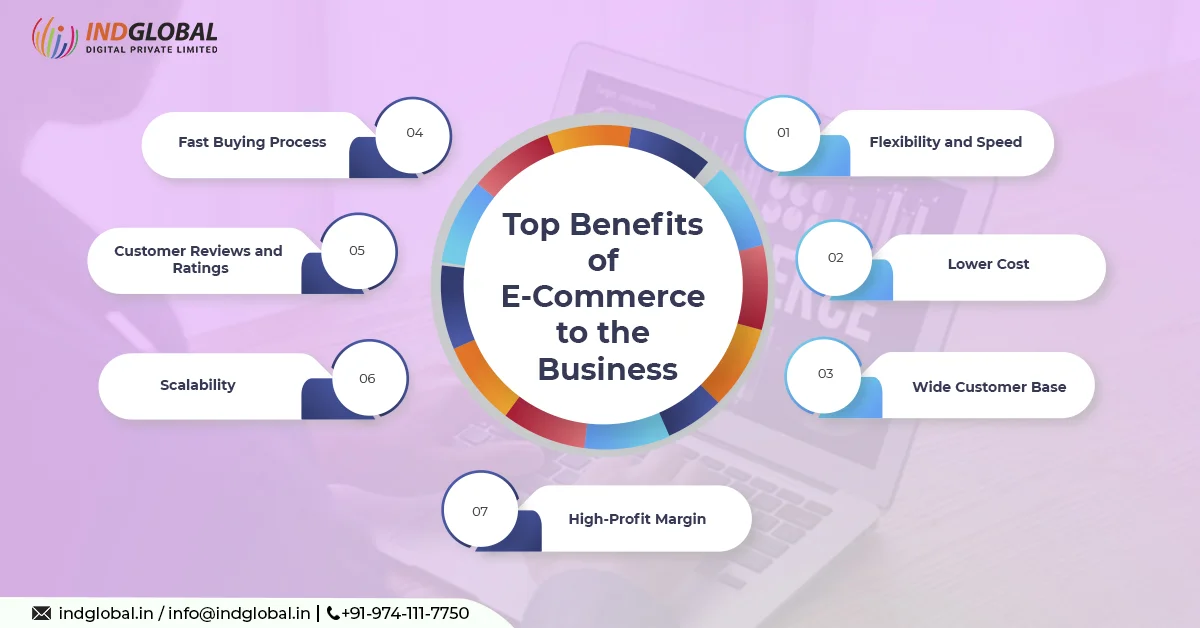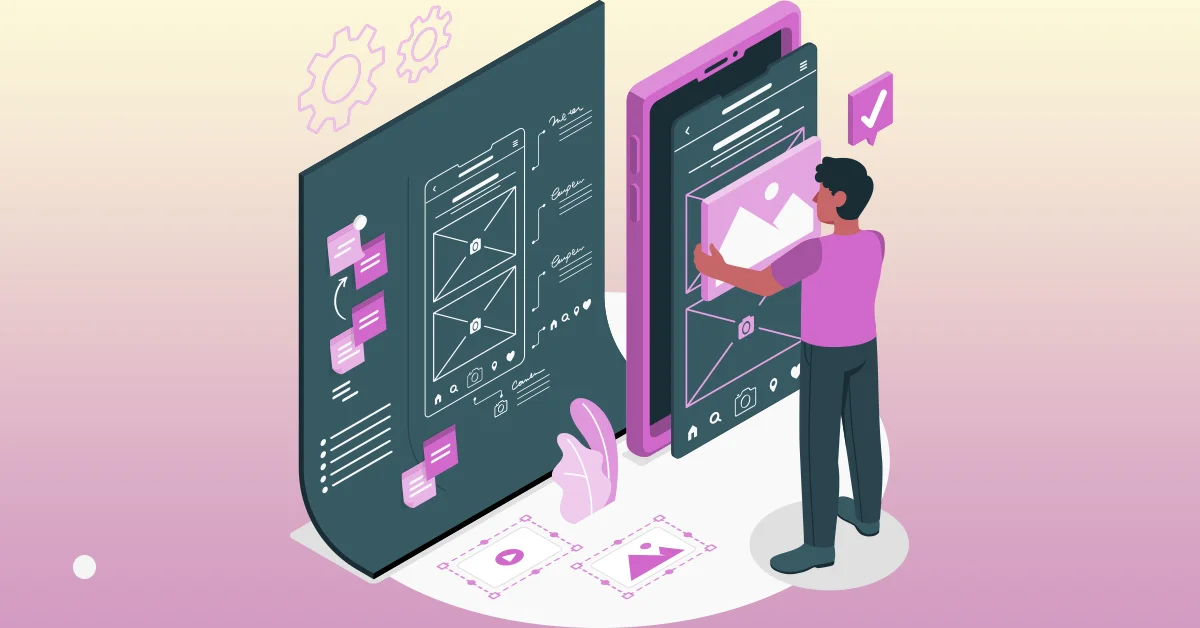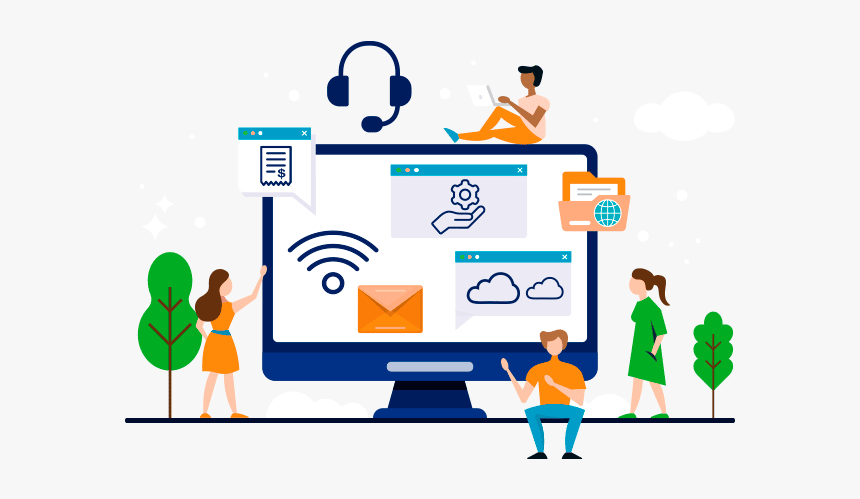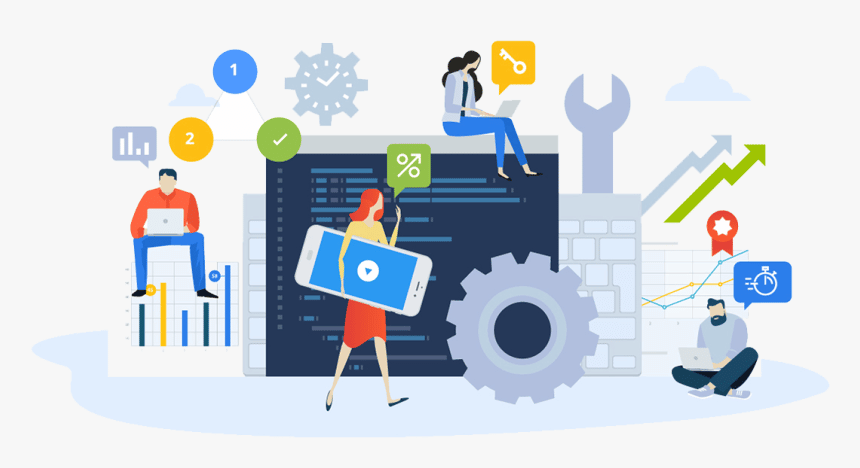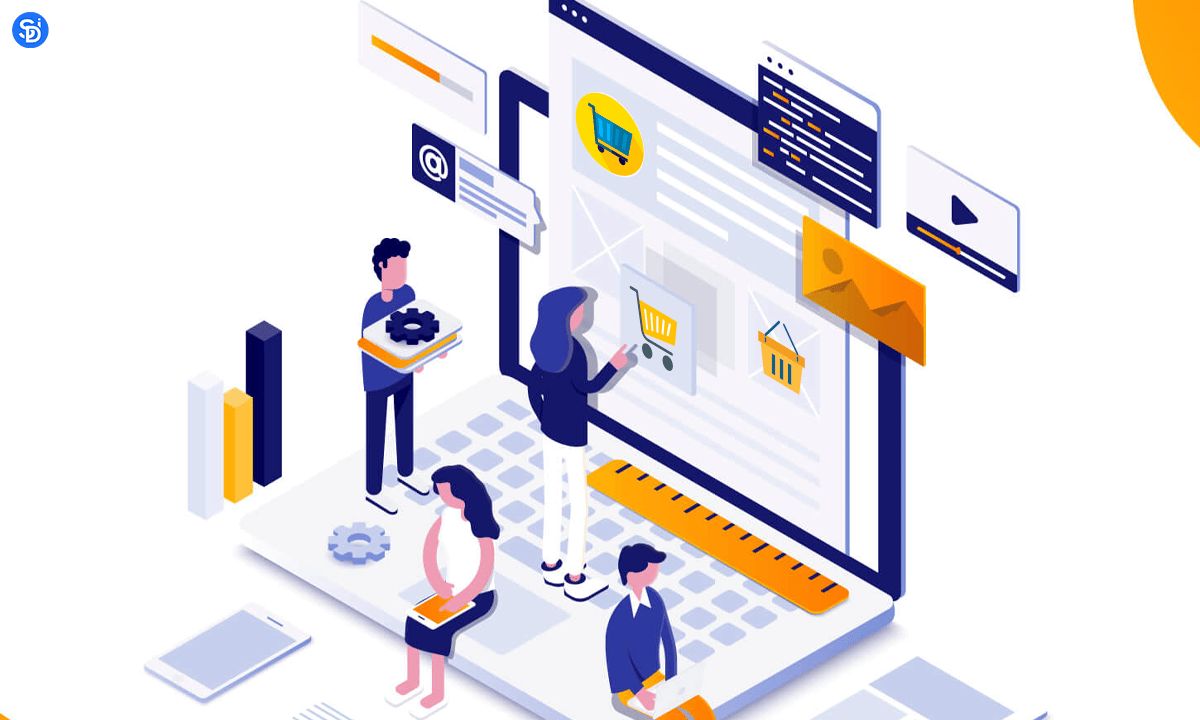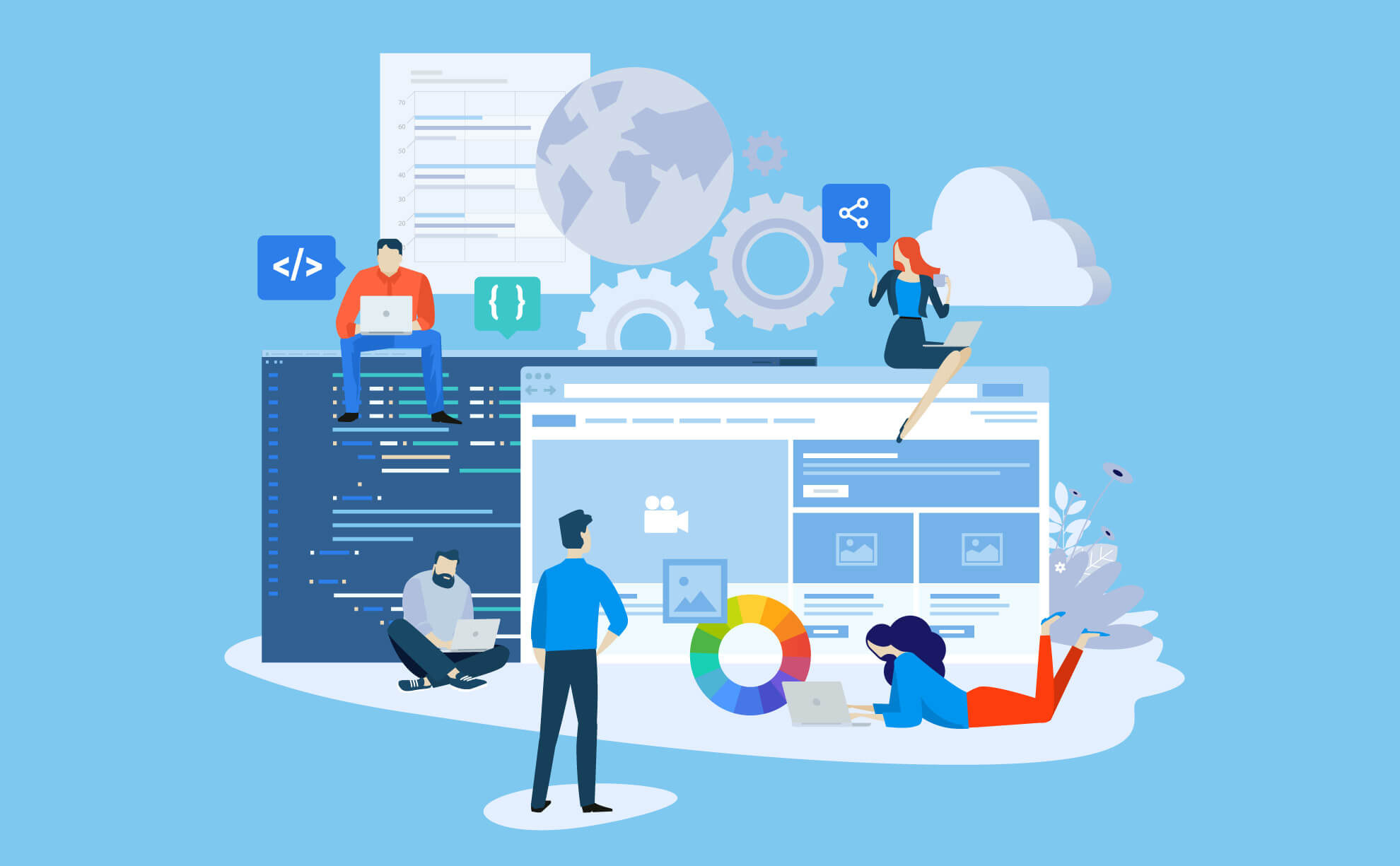For the past several years, users have changed their way of shopping and are shifting to new shopping trends drastically. And, this lets business owners catch up a lot to keep competitive in the desired field. One of the biggest trends in the market today is online shopping, allowing the e-commerce industry to expand rapidly. It was found that e-commerce revenues have grown to 5.4 trillion dollars in 2022.
All this is making the e-retail industry grow faster than imagined as people are getting products delivered to their homes. Therefore, this blog will brief you about e-commerce, its advantages to business, and how to develop a successful website to run your organization effectively. As a business owner, you will also get to know the impact of e-commerce on your industry in the coming years. So, without any further thoughts, scroll down and get to know about e-commerce and its benefits to the business.
What is E-Commerce?
E-commerce is defined as the process of buying and selling products and services online. It offers advantages to many businesses ranging from freelancers, and independent sellers, to medium and large enterprises. One of the best benefits of e-commerce is helping the business to run without any geographical limit.
Now, let us know more advantages that e-commerce offers to business organizations.
Top Benefits of E-Commerce to the Business
1. Flexibility and Speed
In contrast with physical stores, one can easily open an e-commerce store in a few days. To set up an offline business store, you will require space, leasing, construction, and designing time. But, for an e-commerce store, you only need to display the range of products that can be changed instantly. For a physical store, you will require adequate time and preparation to run the business efficiently.
In terms of speed, e-commerce websites outperform retail offline outlets which are considered the most effective feature of e-commerce. Without taking up any physical space, the seller can easily manage all the essential activities from their comfort.
2. Lower Cost
One of the significant advantages of e-commerce is that building an online store is less costly than developing a physical offline store. You are not free from furnishing your outlet, nor are you required to pay any amount or hire more workers. Advertising and marketing campaigns are also not very expensive. Also, the online business store is fully automated and computerized, which saves a lot of money.
One more benefit of e-commerce is the negligence of the middleman which results in cost reduction. The online platform lets business owners create a supply chain as it develops a connection between the seller and buyer.
3. Wide Customer Base
An offline business store is set up at a specific location, and in most cases, people living in the nearby area can only shop. So, having an online store will give you the advantage of not being geographically limited. With no geographical boundaries, e-commerce stores can sell goods around the world. You are not restricted to shops within walking distance.
Also, it is easy for the customers to access the online portal from any location with an internet connection and a device capable of operating it. The online store is open 24/7 for all its visitors and gives real-time updates on when the products will be delivered.
4. Fast Buying Process
To visit a physical store for shopping, the customer has to schedule a trip in advance, even to buy a single product. This involves rearranging the routine time and purchasing the products from the offline store. Therefore, it is an advantage of an online store that expedites the process of purchasing. Through an online store, you can sit back at your home, and order suitable products according to your convenience.
Also, online business stores are open all day long letting people shop at their leisure. The e-commerce stores allow the users to purchase the product without wasting time and saving their travel time by having the product delivered to their doorstep.
5. Customer Reviews and Ratings
Another benefit of having an online store is that customers are encouraged to provide feedback on the online store to learn about their satisfaction and know if there are any issues with the products and services they are ordering. These reviews and ratings about the e-commerce business store let the buyers get proper insights about the online business store and determine if it suits their needs or not.
It also helps sellers to improve their products and services and increases customer satisfaction and sales. Read reviews from the comfort of your home and decide if you wish to buy the products and services or not.
6. Scalability
When a physical store gets an ample number of customers, then it is difficult to manage them due to fewer staff. The expansion of a physical store requires additional resources and space at a proper cost. But, growing an online store is easy as you only require some digital promotions, additional inventories, and some storage space that is less expensive than setting up an offline store.
Also, online availability omits the need to open a new physical store in a different location as you are connected to the global market.
7. High-Profit Margin
As compared to traditional stores, the cost of operating and setting up an online store is low as you save money on labor, marketing, and other things. Most of the e-commerce business stores have a dashboard with benefits for invoices and reports to help the business focus on its finance. Inventory management cost is also reduced when you run an online business store.
Therefore, the overall increase in revenue and low prices help the business focus on growing its profit margins, getting to be known as the top advantage of building an e-commerce store.
Now, you know the top benefits of having an e-commerce business store to run your organization effectively. Let us discuss how you can develop an online website with all these benefits and earn the desired profits.
Build an e-commerce business store by seeking help from skilled web developers and designers from the leading web development company in Bangalore. Contact us now.
How to Develop an E-commerce Website?
If you are a business owner in the retail industry, then building an e-commerce website can help you get a great share. Here is how you can develop an online store in just simple steps.
Step 1- Choose the Ideal Content Management System
Having the right content management system is the first step for every website. There are multiple CMS to choose from such as WordPress, Shopify, and others. You have to choose the right one for your business that matches your budget, and other e-commerce needs.
To pick the best content management system for your business needs, contact our web developers in Bangalore who will help you develop the website using the ideal CMS for your business.
Step 2- Get a Web Hosting Plan
Once you have selected the CMS to use for your website, the next step is to choose a web hosting plan. The web hosting service has a free domain name, SSL certificate, and one-click WordPress installation that eliminates the need to connect the domain and hosting on the content management system.
Step 3- Pick an E-commerce Template or Theme
The first thing to designing your website is selecting a theme. Themes are ready-made designed templates that offer the site a fresh feel and look. There are ample templates or themes to choose from, so if you are building a website on Shopify or WordPress, you will have to select from built-in themes for your website.
Step 4- Build the Web Pages and Customize Your Website
After you have got the most perfect theme to design your online store, the next step is to build the web pages from your homepage to the return policy page or refund page. You can even customize your business store by updating the header and footer, configuring the navigation of the site, and many more.
Step 5- Add Product Listings
No online website is fully complete with product listings. So, once the website is developed, the next step is to create the catalog for products and complete all the product listings. Focus on organizing and categorizing the listings as it lets future visitors find the products easily.
Step 6- Set up the Payment Gateway and Inventory
After the website is built, there are a few things to consider when building an e-commerce website that as setting up the payment gateway to integrate shipping options.
- Choosing and setting up the payment gateway
Several online store owners choose third-party tools such as Paytm or PayPal to make the online process easy and secure. If the customers are redirected to another website, then ensure the data is fully encrypted before transfer.
- Integrating shipping options
If your online platform allows it, you can integrate shipping with the e-commerce website for a seamless experience. Focus more on simplifying business operations and selling products and services. But, before integrating the shipping options, determine its policies such as rate, variable fee, and shipping charges.
Step 7- Test and Launch the Business Website
Before you launch the website, check it thoroughly. Check every link and button on the site and they must be working effectively. Also, 404 error pages need to be designed as per the theme. Run tests to check if the products are added to the cart or not. Check how your website looks on different devices, and if possible, check its performance on web browsers.
Once everything is tested and double-checked, you are ready to launch the website. Announce the launch using social media platforms, guest posts, email listings, and many more ways.
Eager to Build Your Online Business Website? Feel free to contact the top website development company in Bangalore today.
Why Sell Online?
Before you start creating the website, it is essential to know about your business needs to develop a website. Here are some top reasons to know why to sell products and services online.
- Setting up an e-commerce store is cheaper when we compare it with a brick-and-mortar store. It is because physical stores have multiple fixed costs such as rent, bills, infrastructure costs, maintenance, and others.
- People are buying more online as they feel it is convenient and safe. The availability of mobile phones lets users buy products from anywhere and at any time. So, this will let people continue buying online rather than going to a physical store.
- Online shopping creates a personalized customer experience. You can see multiple videos, audio, pictures, customer reviews, and other messaging options to build a great experience with customers.
The Future of Website Development
The website development world brings changes every passing year and makes it challenging for businesses to survive in the digital world. Therefore, business owners have to keep themselves in pace with the latest web development trends to stay ahead of their competitors. But it is critical to find the most efficient web development trend that works well for your organization. So, to save your efforts, here is a list of top web development trends to check out and assess online market requirements.
- Progressive Web Apps
Progressive web apps are an app that functions as a website giving a full-native experience of mobile apps. It is a native app that runs independently. PWA technology has brought different changes in the business world such as flexible distribution, device storage, seamless installation, and many more.
- Dark Mode User Experience
The dark mode experience has become very popular in the global world, and it will surely soar higher in the upcoming years. A dark-themed website with a visual design pattern makes it easier for visitors to enjoy web browsing on any device easily. Some of its advantages are saving battery life, reducing blue light, lowering eye strain, and others.
- Chatbots
AI Chatbots are becoming more versatile to fulfill the requirements of user behavior by bringing natural language processing, machine learning, and data retrieval methods together. It also enhances the experience of the clients by accumulating information, fixing problems, answering queries, and many more. Many big industries like finance, travel, healthcare, education, and others are using Chatbots to gain more profits.
With these three, more web development trends will change the e-commerce industry and its functioning. Some of them are-
- Internet of Things
- Motion UI
- Serverless Computing
- API-First Development
- Single Page Application
These web development trends will change the way businesses communicate with their users in the coming years. These technologies will help the business owners to enhance their user engagement and help the business to stay ahead of the competitors.
Wrapping Up
Therefore, for business owners, running an online business is less risky with few resources and setting up the shop in a short time. Managing an e-commerce website includes every part of operating a business, be it working, planning, or setting up the learning curve.
And, selling online is the right way forward. That does not mean that physical stores will disappear. If you are running an offline store, then you can also take advantage of e-commerce web services by embracing the hybrid strategy that lets your customers shop online and in physical stores. Although this is implemented correctly, then the hybrid process is very rewarding for your business.
So, rather than waiting longer, it is time to connect with the best e-commerce web development company in Bangalore and get your website developed at the most reasonable prices.
Next Post ←
A Guide to Knowing the Importance of Developing a Professional Website for Your Business
RELATED ARTICLES
Request a quote or Talk to an expert
We guarantee a response in 6 hours or less. And the best bang for your buck.




